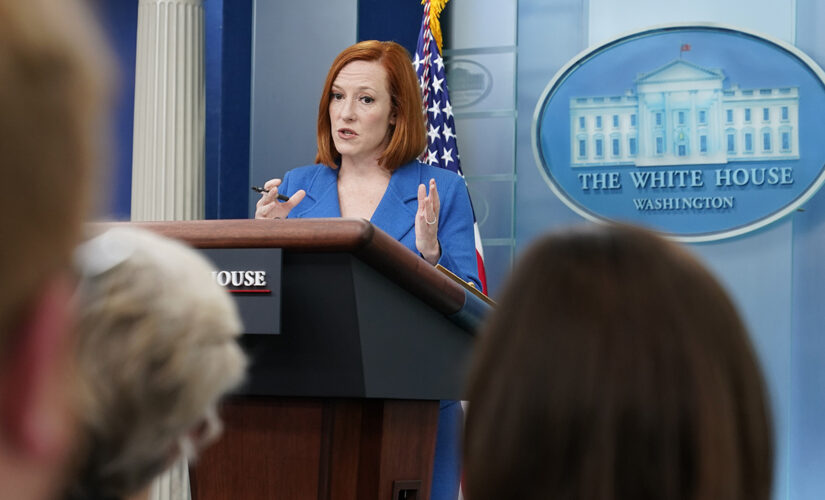NEWYou can now listen to Fox News articles!
White House press secretary Jen Psaki attempted to dismiss a reporter’s question Friday when he asked about the “conflicts of interest” the Biden administration faces “when it comes to sanctioning people (from Russia and China) who have done business with” the Biden family.
Steven Nelson, a reporter for the New York Post, highlighted a 2020 report from the Senate Homeland Security and Finance committees that alleged an investment firm co-founded by Hunter Biden — Rosemont Seneca Thornton — “received $3.5 million in a wire transfer” from Russian billionaire Elena Baturina. He also noted a report that claimed then-Vice President Biden had dinner with the same woman in Georgetown.
White House press secretary Jen Psaki speaks during a press briefing at the White House, Friday, March 18, 2022, in Washington.
(AP Photo/Patrick Semansky)
“This Elena Baturina, she has not been sanctioned yet by the U.S. government. How is President Biden navigating conflicts of interest when it comes to sanctioning people who have done business with this family and can you explain to us what this $3.5 million was for,” Nelson asked.
“I don’t have any confirmation of the accuracy of that report, so I have no more further details,” Psaki responded, moving to call on other reporters in the room.
Pressed once more about the conflicts of interest in sanctioning those in Russia who reportedly have had business dealings with the Biden family, Psaki said, “What would be his conflicts of interest?”
“His son’s company allegedly got $3.5 million from …” Nelson said before Psaki interrupted.
“Which I have no confirmation of, and he’s continued to sanction oligarchs more than we’ve sanctioned in the past, so I’m not sure that’s a conflict of interest,” Psaki responded.
The New York Times confirmed the Hunter Biden laptop story that was largely written off by mainstream news outlets as disinformation when the New York Post first reported it ahead of the 2020 presidential election.
(Getty Images | New York Post)
Late last year, Hunter Biden, according to his attorney, divested from his assets with Chinese private equity firm Bohai Harvest RST Equity Investment Fund Management Co. through Skaneateles LLC.
Attempting to call on other reporters, Psaki was pressed by Nelson about that divestment and potential conflicts of interest surrounding President Biden’s decision-making in regard to China.
“We have received not even basic transparency about who bought out his stake, when this happened and how much money changed hands,” Nelson said. “Did he actually divest, and if so, can you agree to basic transparency?”
CLICK HERE TO GET THE FOX NEWS APP
“He’s a private citizen, he doesn’t work for the government,” Psaki said. “I’d point you to his representatives.”
White House press secretary Jen Psaki speaks during a press briefing at the White House, Friday, March 18, 2022, in Washington.
(AP Photo/Patrick Semansky)
A report Wednesday by The New York Times confirmed the authenticity of Hunter Biden’s infamous laptop, which was left in a Delaware repair shop in 2019 by the first son before being turned over to the FBI by the repair shop owner.
The new Times report, which was flagged by The New York Post and focused on the investigation into Hunter Biden’s taxes and his international business dealings, noted prosecutors had examined emails between Biden and some business associates that “appear to have come from a laptop abandoned by Mr. Biden in a Delaware repair shop” and “were authenticated by people familiar with them and with the investigation.”
Psaki previously said reporting on Hunter Biden’s laptop in 2020 was part of a “Russian disinformation” campaign.
Fox News’ Houston Keene, Andrew Mark Miller, and Joseph A. Wulfsohn contributed to this article.




